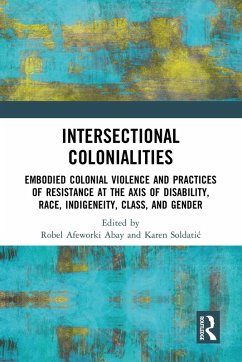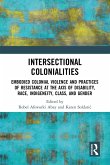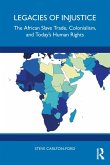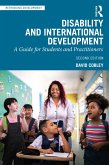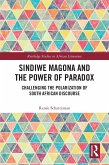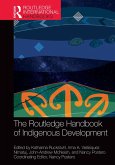Intersectional Colonialities (eBook, PDF)
Embodied Colonial Violence and Practices of Resistance at the Axis of Disability, Race, Indigeneity, Class, and Gender
Redaktion: Afeworki Abay, Robel; Soldatic, Karen
42,95 €
42,95 €
inkl. MwSt.
Sofort per Download lieferbar

21 °P sammeln
42,95 €
Als Download kaufen

42,95 €
inkl. MwSt.
Sofort per Download lieferbar

21 °P sammeln
Jetzt verschenken
Alle Infos zum eBook verschenken
42,95 €
inkl. MwSt.
Sofort per Download lieferbar
Alle Infos zum eBook verschenken

21 °P sammeln
Intersectional Colonialities (eBook, PDF)
Embodied Colonial Violence and Practices of Resistance at the Axis of Disability, Race, Indigeneity, Class, and Gender
Redaktion: Afeworki Abay, Robel; Soldatic, Karen
- Format: PDF
- Merkliste
- Auf die Merkliste
- Bewerten Bewerten
- Teilen
- Produkt teilen
- Produkterinnerung
- Produkterinnerung

Bitte loggen Sie sich zunächst in Ihr Kundenkonto ein oder registrieren Sie sich bei
bücher.de, um das eBook-Abo tolino select nutzen zu können.
Hier können Sie sich einloggen
Hier können Sie sich einloggen
Sie sind bereits eingeloggt. Klicken Sie auf 2. tolino select Abo, um fortzufahren.

Bitte loggen Sie sich zunächst in Ihr Kundenkonto ein oder registrieren Sie sich bei bücher.de, um das eBook-Abo tolino select nutzen zu können.
This book provides a rich synthesis of empirical research and theoretical engagements with questions of disability across different practices of colonialism as historically defined - post/de/anti/settler colonialism.
- Geräte: PC
- ohne Kopierschutz
- eBook Hilfe
- Größe: 15.19MB
Andere Kunden interessierten sich auch für
![Intersectional Colonialities (eBook, ePUB) Intersectional Colonialities (eBook, ePUB)]() Intersectional Colonialities (eBook, ePUB)42,95 €
Intersectional Colonialities (eBook, ePUB)42,95 €![Legacies of Injustice (eBook, PDF) Legacies of Injustice (eBook, PDF)]() Steve Carlton-FordLegacies of Injustice (eBook, PDF)40,95 €
Steve Carlton-FordLegacies of Injustice (eBook, PDF)40,95 €![Disability and International Development (eBook, PDF) Disability and International Development (eBook, PDF)]() David CobleyDisability and International Development (eBook, PDF)39,95 €
David CobleyDisability and International Development (eBook, PDF)39,95 €![Sindiwe Magona and the Power of Paradox (eBook, PDF) Sindiwe Magona and the Power of Paradox (eBook, PDF)]() Renée SchattemanSindiwe Magona and the Power of Paradox (eBook, PDF)42,95 €
Renée SchattemanSindiwe Magona and the Power of Paradox (eBook, PDF)42,95 €![The Routledge Handbook of Indigenous Development (eBook, PDF) The Routledge Handbook of Indigenous Development (eBook, PDF)]() The Routledge Handbook of Indigenous Development (eBook, PDF)46,95 €
The Routledge Handbook of Indigenous Development (eBook, PDF)46,95 €![Southern Postcolonialisms (eBook, PDF) Southern Postcolonialisms (eBook, PDF)]() Southern Postcolonialisms (eBook, PDF)49,95 €
Southern Postcolonialisms (eBook, PDF)49,95 €![Recolonizing Africa (eBook, PDF) Recolonizing Africa (eBook, PDF)]() Mariam MnigaRecolonizing Africa (eBook, PDF)44,95 €
Mariam MnigaRecolonizing Africa (eBook, PDF)44,95 €-
-
-
This book provides a rich synthesis of empirical research and theoretical engagements with questions of disability across different practices of colonialism as historically defined - post/de/anti/settler colonialism.
Dieser Download kann aus rechtlichen Gründen nur mit Rechnungsadresse in A, B, BG, CY, CZ, D, DK, EW, E, FIN, F, GR, HR, H, IRL, I, LT, L, LR, M, NL, PL, P, R, S, SLO, SK ausgeliefert werden.
Produktdetails
- Produktdetails
- Verlag: Taylor & Francis eBooks
- Seitenzahl: 312
- Erscheinungstermin: 28. Mai 2024
- Englisch
- ISBN-13: 9781040027431
- Artikelnr.: 70301867
- Verlag: Taylor & Francis eBooks
- Seitenzahl: 312
- Erscheinungstermin: 28. Mai 2024
- Englisch
- ISBN-13: 9781040027431
- Artikelnr.: 70301867
- Herstellerkennzeichnung Die Herstellerinformationen sind derzeit nicht verfügbar.
Robel Afeworki Abay is a sociologist and a guest professor of participatory approaches in social and health sciences at Alice Salomon University of Applied Sciences Berlin. Karen Soldati¿ is a Canadian excellence research chair, Health Equity and Community Wellbeing, Toronto Metropolitan University and Whitlam Fellow at Western Sydney University.
0.The relevance of analysing embodied violence and practices of resistance, contestation, and mobilisation at the axis of disability, race, indigeneity, class, and gender. 1.Decolonising disability studies: Conceptualising disability justice from an African community ideal. 2.Racialized and Gendered Ableism: The Epistemic Erasure and Epistemic Labour of Disability in Transnational Contexts. 3.Trans-Latinidades, disability and decoloniality: Diasporic and Global South LatDisCrit lessons from Central America. 4.Degeneracy & Replacement: Reproducing white settler anxieties in the 21st century. 5.Disabled Romani people in Germany: Learning from the notion of indigeneity in disability studies outside of Settler-Colonial states. 6.Africa and the epistemic normativity of disability. 7.Impossible working lives and disabled bodies during racialised capitalism: Perspectives from Germany and the UK. 8.Stigma as a structure of disablement: Towards collective postcolonial justice. 9.Coloniality, disability, and the family in Kurdistan-Iraq. 10.Raising children with autism in a patriarchal society of a new liberal state: Experiences of mothers of autistic children in Bangladesh. 11.Disability discourse and Muslim student organisations in Malang, Indonesia. 12.Migration studies and disability studies: Colonial engagements past, present and future. 13.Colonial and ableist constructions of 'vulnerability' shaping the lives of disabled asylum seekers and refugees in the UK and Germany. 14.Towards a decolonial approach to disability as knowledge and praxis: Unsettling the 'colonial' and re-imagining research as spaces of struggles. 15.Reflecting on the How Questions: Using intersectional methods for policy changes. 16.Cultural humility in participatory research: Debunking the myth of 'hard-to-reach' groups.
0.The relevance of analysing embodied violence and practices of resistance, contestation, and mobilisation at the axis of disability, race, indigeneity, class, and gender. 1.Decolonising disability studies: Conceptualising disability justice from an African community ideal. 2.Racialized and Gendered Ableism: The Epistemic Erasure and Epistemic Labour of Disability in Transnational Contexts. 3.Trans-Latinidades, disability and decoloniality: Diasporic and Global South LatDisCrit lessons from Central America. 4.Degeneracy & Replacement: Reproducing white settler anxieties in the 21st century. 5.Disabled Romani people in Germany: Learning from the notion of indigeneity in disability studies outside of Settler-Colonial states. 6.Africa and the epistemic normativity of disability. 7.Impossible working lives and disabled bodies during racialised capitalism: Perspectives from Germany and the UK. 8.Stigma as a structure of disablement: Towards collective postcolonial justice. 9.Coloniality, disability, and the family in Kurdistan-Iraq. 10.Raising children with autism in a patriarchal society of a new liberal state: Experiences of mothers of autistic children in Bangladesh. 11.Disability discourse and Muslim student organisations in Malang, Indonesia. 12.Migration studies and disability studies: Colonial engagements past, present and future. 13.Colonial and ableist constructions of 'vulnerability' shaping the lives of disabled asylum seekers and refugees in the UK and Germany. 14.Towards a decolonial approach to disability as knowledge and praxis: Unsettling the 'colonial' and re-imagining research as spaces of struggles. 15.Reflecting on the How Questions: Using intersectional methods for policy changes. 16.Cultural humility in participatory research: Debunking the myth of 'hard-to-reach' groups.
